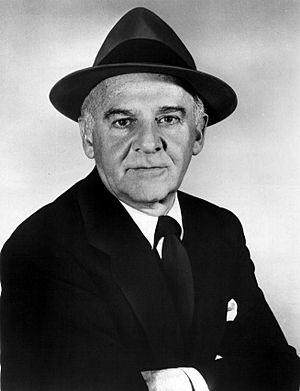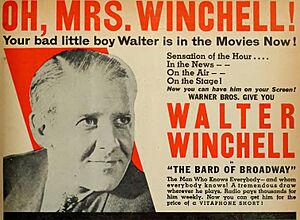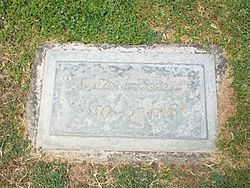Walter Winchell facts for kids
Quick facts for kids
Walter Winchell
|
|
|---|---|

Winchell in 1960
|
|
| Born |
Walter Winschel
April 7, 1897 New York City, U.S.
|
| Died | February 20, 1972 (aged 74) Los Angeles, California, U.S.
|
| Resting place | Greenwood/Memory Lawn Mortuary & Cemetery |
| Occupation |
|
| Spouse(s) |
Rita Greene
(m. 1919; div. 1928) |
| Partner(s) | June Magee |
| Children | 3 |
Walter Winchell (born April 7, 1897 – died February 20, 1972) was a famous American newspaper writer and radio host. He was known for his unique style of sharing news and gossip. Walter Winchell started as a performer on stage. Later, he became a reporter in New York City.
He became very famous in the 1930s with his newspaper columns and popular radio show. He was known for his fast-paced news updates, jokes, and use of popular slang from the 1920s. One writer, Neal Gabler, said that Winchell's popularity made journalism feel more like entertainment.
Winchell found both important news and embarrassing stories about famous people. He did this by using his many contacts in the entertainment world and among criminal groups. Later, he also made friends in law enforcement and politics. He was known for trading information, sometimes keeping quiet in exchange for a story. His bold style made people both afraid of him and admire him. Movies and plays were even made about his character.
As World War II got closer in the 1930s, he spoke out against those who supported Nazism. In the 1950s, he joined Joseph McCarthy in his efforts against Communism. However, his connection to McCarthy eventually made him less popular. His style also did not fit well with television news. In 1959, he returned to TV as the narrator for the crime show The Untouchables. Over the years, he appeared in many films and TV shows as an actor.
Contents
Walter Winchell's Career Journey
Walter Winchell was born in New York City. His parents were immigrants from Russia. He left school in the sixth grade. He began performing in a stage group called the "Newsboys Sextet." Famous performers like Eddie Cantor were also in this group. During this time, Winchell was a tap dancer. He also served in the U.S. Navy during World War I.
He started his writing career by putting notes about his acting group on bulletin boards backstage. In 1920, he joined a newspaper called Vaudeville News. Then, in 1924, he moved to the Evening Graphic. His column there was called Mainly About Mainstreeters. On June 10, 1929, he was hired by the New York Daily Mirror. Here, he wrote the first widely shared gossip column, called On-Broadway. This column was sent to many newspapers by King Features Syndicate.
He first appeared on radio on May 12, 1930, on WABC in New York. His show, Saks on Broadway, was 15 minutes long. It gave business news about Broadway. In 1932, he moved to WJZ and NBC Blue (later ABC Radio) for his show Jergens Journal.
Connections and Influence
By the 1930s, Winchell was friends with Owney Madden, a well-known criminal leader in New York. However, in 1932, Winchell became worried about his safety. He feared he might be harmed because of his connections. He went to California and returned weeks later with a new interest in supporting law enforcement. He became friends with J. Edgar Hoover, the head of the FBI. Winchell helped Hoover by providing information about criminals.
His newspaper column was printed in over 2,000 newspapers worldwide. It was read by 50 million people every day from the 1920s to the early 1960s. His Sunday night radio show was heard by another 20 million people. In 1948, Winchell had the most popular radio show.
Strong Opinions and Beliefs
Walter Winchell was Jewish. He was one of the first people in America to speak out against Adolf Hitler. He also attacked American groups that supported Nazism, like the German-American Bund. He strongly supported President Franklin D. Roosevelt and his New Deal programs. Winchell often spoke for Roosevelt's government, especially as the war in Europe grew closer.
He criticized Americans who wanted to stay out of the war. He called them supporters of Hitler. He also openly attacked famous isolationists like Charles Lindbergh. Throughout the 1930s and 1940s, Winchell also strongly supported civil rights for African Americans. He often spoke out against the Ku Klux Klan and other racist groups.
After World War II, Winchell began to say that Communism was the biggest threat to America.
Winchell on Television
In the 1950s, Winchell supported Senator Joseph McCarthy's efforts to find Communists in the entertainment industry. However, as public opinion turned against McCarthy, Winchell's own popularity began to drop. His weekly radio show was also shown on ABC television starting in 1952. By 1953, his radio and TV shows were broadcast at the same time. He ended this in 1955 due to a disagreement with ABC.
In 1957, he starred in The Walter Winchell File, a TV crime show. It showed real cases from the New York City Police Department. In 1956, he signed with NBC to host a variety show called The Walter Winchell Show. This show was canceled after only 13 weeks. In 1959, ABC hired him again to narrate The Untouchables for four seasons.
In the early 1960s, a public argument with TV host Jack Paar effectively ended Winchell's career. Winchell had upset Paar earlier by refusing to take back a story about Paar's marriage. Paar then called Winchell a "silly old man" on his show. He also shared other examples of Winchell's unfair actions. No one had dared to criticize Winchell publicly before. But by then, his influence had weakened. His main newspaper, the New York Daily Mirror, closed in 1963. His number of readers kept falling, and he slowly disappeared from public view.
Challenges and Criticisms
As his career went on, especially after World War II, Winchell became known for trying to harm the careers of people he disagreed with. A common tactic was to claim they had ties to Communist groups. He would also call people names. For example, he called radio host Barry Gray "Borey Pink."
For most of his career, his newspaper and radio contracts protected him from lawsuits for spreading false information. He would often publish things told to him in private by friends. By the mid-1950s, many people saw him as arrogant and cruel.
In 1951, while on a tour in America, Josephine Baker criticized a club for not allowing black customers. She then criticized Winchell, who used to be her friend, for not defending her. Winchell quickly responded with harsh public attacks. He even accused her of supporting Communism. This led to Baker's work visa being canceled, forcing her to leave the U.S. It took almost ten years for her to be allowed back. This and similar events hurt his reputation and power.
On April 4, 1954, Winchell's radio and TV shows helped spread fear about the polio vaccine. Winchell claimed that the U.S. Public Health Services found live polio viruses in some vaccine batches. He said, "It killed several monkeys... the United States Public Health Service will confirm this in about 10 days." Dr. Jonas Salk, who developed the polio vaccine, immediately said that the vaccine had been tested many times. He confirmed it was safe and free of live viruses.
Winchell's Unique Style
After Winchell became successful, many other writers started to write gossip columns. Winchell wrote in a style full of slang and short sentences. His casual writing style once angered a criminal figure named Dutch Schultz. Schultz publicly criticized Winchell for using the word "pushover" to describe his interest in blonde women. Some of Winchell's most famous sayings include: "Nothing recedes like success," and "I usually get my stuff from people who promised somebody else that they would keep it a secret."
Herman Klurfeld was a writer who helped Winchell for almost 30 years. He started writing four newspaper columns a week for Winchell in 1936. He also wrote many of the famous one-liners that Winchell used at the end of his Sunday radio shows. One of Klurfeld's jokes was "She's been on more laps than a napkin." In 1952, it was revealed that Klurfeld was Winchell's ghostwriter. Klurfeld later wrote a book about Winchell's life.
Winchell started his radio shows by pressing a telegraph key. This sound made it feel urgent and important. He would then say his famous opening line: "Good evening, Mr. and Mrs. America from border to border and coast to coast and all the ships at sea. Let's go to press." He would read his stories very quickly, speaking up to 197 words per minute. His fast way of speaking can also be heard in his narration for the TV series The Untouchables.
Walter Winchell's Family Life
On August 11, 1919, Walter Winchell married Rita Greene, who was his partner on stage. They separated a few years later. He then lived with Elizabeth June Magee. They had a daughter named Walda in 1927. They also adopted another daughter named Gloria. Winchell divorced Rita Greene in 1928. However, he never married June Magee, but they lived together as a married couple for the rest of their lives.
Winchell and Magee had three children: Gloria (adopted), Walda, and a son, Walter Jr. Gloria died at the age of nine from pneumonia. Walda spent time in hospitals. Walter Jr. passed away on Christmas night in 1968.
Later Years and Passing
In the 1960s, Winchell wrote some columns for the film magazine Photoplay. He announced his retirement on February 5, 1969. He said his son's death and his companion June Magee's health were major reasons. Exactly one year after he retired, June Magee died in a hospital in Phoenix, Arizona.
Winchell spent his last two years living alone at the Ambassador Hotel in Los Angeles.
Walter Winchell died from prostate cancer on February 20, 1972, in Los Angeles, California. He was 74 years old. He is buried at Greenwood/Memory Lawn Mortuary & Cemetery in Phoenix.
Winchell's Lasting Impact
Even when Winchell was alive, other journalists often criticized how he affected the news.
Despite the arguments around Winchell, his popularity allowed him to help causes he cared about. In 1946, after his friend Damon Runyon died from cancer, Winchell asked his radio listeners for donations to fight the disease. This led Winchell to create the Damon Runyon Cancer Memorial Fund. It is now called the Damon Runyon Cancer Research Foundation. He led this charity with help from many celebrities until his own death from cancer in 1972.
In 1950, Ernest Lehman wrote a story for Cosmopolitan magazine. It was about a tough journalist named J.J. Hunsecker. Many people thought this character was based on Walter Winchell and his power. This story was later made into the film Sweet Smell of Success (1957).
Walter Winchell is also given credit for creating the word "frienemy". This word appeared in a newspaper article in 1953.
In his 1961 book Stranger in a Strange Land, Robert A. Heinlein used the term "winchell" to describe a gossip columnist who interferes in politics. This was a direct reference to Walter Winchell.
Winchell's Special Language
Winchell's colorful and often copied language led to the term "Winchellism." This means any word or phrase that Walter Winchell or his imitators made popular. One language expert at the time said that Winchell created many expressions. These words became common among his readers and followers. This special language was called "Winchellese." Through his widely read newspaper column, Winchell became a leader in creating new slang. He used slang, hints, and made-up words. This also helped protect him from lawsuits for spreading false information.
Winchell invented his own phrases that were seen as a bit daring at the time. Some of his expressions for falling in love included: "pashing it," "sizzle for," "that way," and "merged."
Sometimes, "Winchellism" can also mean spreading rumors or false information that harms someone's reputation.
|
See also
 In Spanish: Walter Winchell para niños
In Spanish: Walter Winchell para niños
 | Georgia Louise Harris Brown |
 | Julian Abele |
 | Norma Merrick Sklarek |
 | William Sidney Pittman |



